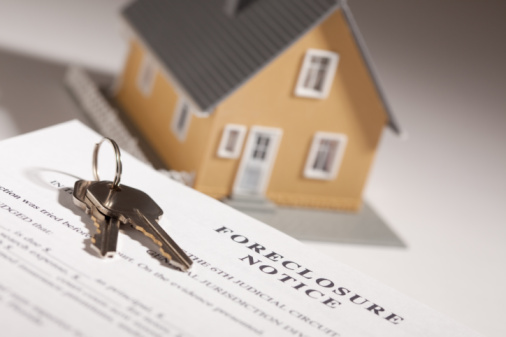Foreclosure rates have dropped sharply from recession levels and are at the lowest point in a decade, according to research firm RealtyTrac. However, they remain at extremely high levels in by states hardest hit by the collapse of the housing bubble. In several of these states, such as Florida and Nevada, many homeowners remain desperate.
As for the current foreclosure picture nationwide:
RealtyTrac released its August 2015 U.S. Foreclosure Market Report, which shows a total of 109,561 U.S. properties with foreclosure filings — default notices, scheduled auctions and bank repossessions — in August, down 12 percent from the previous month and down 6 percent from a year ago. The 6 percent year-over-year decrease in August followed five consecutive months with year-over-year increases.
The rise in number of residences in which owners have reached deep trouble is slowing substantially:
A total of 45,072 U.S. properties started the foreclosure process for the first time in August, down 1 percent from previous month and down 19 percent from year ago to lowest level since November 2005. So far in 2015, foreclosure starts have averaged 49,362 per month, below the pre-crisis average of 52,279 per month in 2005 and 2006.
ALSO READ: 5 States Account for 32% of Underwater Mortgages
The bubble may be reinflating, but certainly not in states where rates are well above the national average. That is another indication of how uneven home prices and foreclosure rates are, not unlike poverty rates and median household incomes. According to RealtyTrac:
Nevada foreclosure activity increased 4 percent from a year ago in August — driven largely by a 233 percent jump in bank repossessions — and the state posted the nation’s highest foreclosure rate for the first time since September 2014. One in every 507 Nevada housing units had a foreclosure filing in August, more than twice the national average.
Maryland foreclosure activity was unchanged from a year ago despite a 429 spike in bank repossessions, and the state posted the nation’s second highest foreclosure rate for the third month in a row. One in every 534 Maryland housing units had a foreclosure filing in August.
New Jersey foreclosure activity increased 3 percent from a year ago — driven largely by a 295 percent year-over-year increase in bank repossessions and 38 percent year-over-year increase in scheduled foreclosure auctions — and the state posted the nation’s third highest state foreclosure rate for the third month in a row. One in every 539 New Jersey housing units had a foreclosure filing in August.
Florida’s foreclosure rate dropped out of the top three highest among the states for the first time since June 2012 thanks in part to a 33 percent year-over-year decrease in foreclosure activity in August to the lowest level since April 2007.
South Carolina foreclosure activity increased 11 percent from a year ago in August, boosting the state’s foreclosure rate to fifth highest nationwide. One in every 863 South Carolina housing units had a foreclosure filing in August
As housing prices plunged during the recession, the situations in Florida and Nevada, in particular, became so bad that some experts forecast they would never come back to 2005 and 2006 levels. The new RealtyTrac data show that opinion may be true.
ALSO READ: America’s Richest (and Poorest) States
It’s Your Money, Your Future—Own It (sponsor)
Are you ahead, or behind on retirement? For families with more than $500,000 saved for retirement, finding a financial advisor who puts your interest first can be the difference, and today it’s easier than ever. SmartAsset’s free tool matches you with up to three fiduciary financial advisors who serve your area in minutes. Each advisor has been carefully vetted and must act in your best interests. Start your search now.
If you’ve saved and built a substantial nest egg for you and your family, don’t delay; get started right here and help your retirement dreams become a retirement reality.
Thank you for reading! Have some feedback for us?
Contact the 24/7 Wall St. editorial team.


